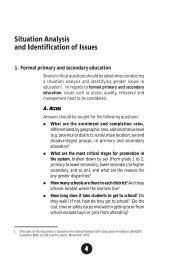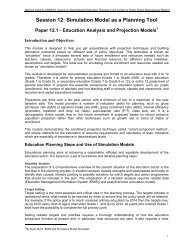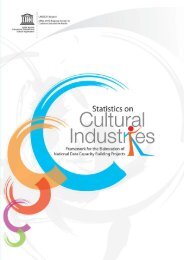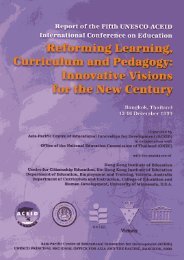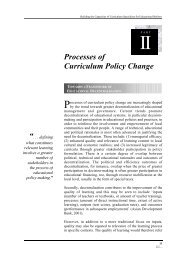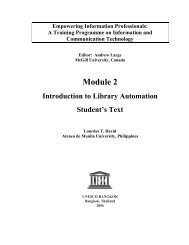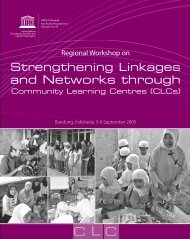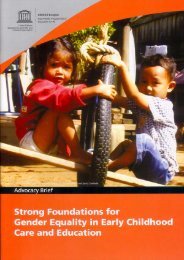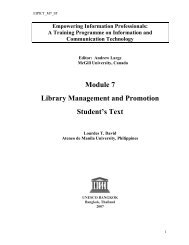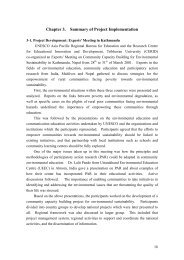Educational Finance in Thailand - UNESCO Bangkok
Educational Finance in Thailand - UNESCO Bangkok
Educational Finance in Thailand - UNESCO Bangkok
You also want an ePaper? Increase the reach of your titles
YUMPU automatically turns print PDFs into web optimized ePapers that Google loves.
F<strong>in</strong>al Report, Volume II/3 Anthony. Cresswell: <strong>Educational</strong> <strong>F<strong>in</strong>ance</strong> <strong>UNESCO</strong>-PROAP TA 2996-THA<br />
Education Management and <strong>F<strong>in</strong>ance</strong> Study July 1999<br />
3.5.2. Development and implementation strategies<br />
a. The success of the reforms recommended here will depend <strong>in</strong> large part on the<br />
efforts and abilities of educators and other officials at the prov<strong>in</strong>cial, district, and<br />
LEA levels. They will be called upon to work <strong>in</strong> new ways, solve new problems,<br />
and apply new skills and techniques. They will need tra<strong>in</strong><strong>in</strong>g and support to<br />
succeed. This need suggests three strategies for tra<strong>in</strong><strong>in</strong>g and human resource<br />
issues. For the f<strong>in</strong>ancial recommendations, the primary actors will be<br />
adm<strong>in</strong>istrators so they are the ma<strong>in</strong> focus of attention here. One strategy is to<br />
assess the exist<strong>in</strong>g skills and abilities of these adm<strong>in</strong>istrators. Our field visits<br />
revealed a number of school pr<strong>in</strong>cipals with high levels of skill and welldeveloped<br />
systems for budget management and decision mak<strong>in</strong>g. A tra<strong>in</strong><strong>in</strong>g<br />
strategy should build <strong>in</strong> these strengths, and <strong>in</strong>clude identification of those areas<br />
and issues <strong>in</strong> need of greatest <strong>in</strong>vestment. A survey of adm<strong>in</strong>istrators and focus<br />
group sessions <strong>in</strong> various regions could reveal the high priority areas <strong>in</strong> need of<br />
attention. Adm<strong>in</strong>istrator organizations should be <strong>in</strong>volved <strong>in</strong> these assessment<br />
activities to make best use of their expertise, and to ensure that the effort is not<br />
seen as an evaluation of <strong>in</strong>dividuals.<br />
b. A second strategy would <strong>in</strong>clude gradual <strong>in</strong>troduction of the new budget<br />
processes and adm<strong>in</strong>istrative procedures <strong>in</strong> pilot projects for test<strong>in</strong>g and<br />
adjustment. The pilot projects should be located <strong>in</strong> mix of prov<strong>in</strong>ces, some of<br />
which with relatively well developed central and local capacities and others with<br />
less. This would allow for an exploration of the full range of problems likely to be<br />
encountered as implementation is expanded throughout the country. Experience <strong>in</strong><br />
these pilot projects would provide useful experience <strong>in</strong> identify<strong>in</strong>g the tra<strong>in</strong><strong>in</strong>g and<br />
support needs of adm<strong>in</strong>istrators at each level.<br />
3.5.3. Decentralization and budget control: the need for flexibility and quality<br />
control<br />
Schools cannot be responsive to reform <strong>in</strong>itiatives from the central Government,<br />
or to consumer preferences if they are tightly constra<strong>in</strong>ed by rules and budget<br />
regulations. Exist<strong>in</strong>g l<strong>in</strong>e-item control of budgets from the central level of<br />
Government seems far too restrictive. The ma<strong>in</strong> reasons for this k<strong>in</strong>d of control,<br />
quality assurance and avoidance of corruption, can be achieved by other, less<br />
<strong>in</strong>trusive means. The mechanisms are <strong>in</strong> place already for effective report<strong>in</strong>g of<br />
school budgets and audit<strong>in</strong>g of school expenditures. Review of these <strong>in</strong>formation<br />
sources by local and higher-level government officials can assure that resources<br />
are be<strong>in</strong>g properly used. School officials can be more responsible for budget<br />
decisions as long as the mechanisms for accountability are <strong>in</strong> place as well. The<br />
central level is concerned as well with total expenditure and controll<strong>in</strong>g<br />
obligations for subsidies to the prov<strong>in</strong>ces and school levels. However, these<br />
controls can be exercised at the aggregate level, and ma<strong>in</strong>ta<strong>in</strong> overall national<br />
spend<strong>in</strong>g policies without <strong>in</strong>trud<strong>in</strong>g <strong>in</strong> the local level resource allocation<br />
mechanisms. Therefore the budget system at the national level should be<br />
concerned primarily with the aggregate levels of support for education. The<br />
exist<strong>in</strong>g mechanisms for report<strong>in</strong>g and audit<strong>in</strong>g of schools budgets should be<br />
improved and made subject to assessment and monitor<strong>in</strong>g by the Central<br />
Government.<br />
110



